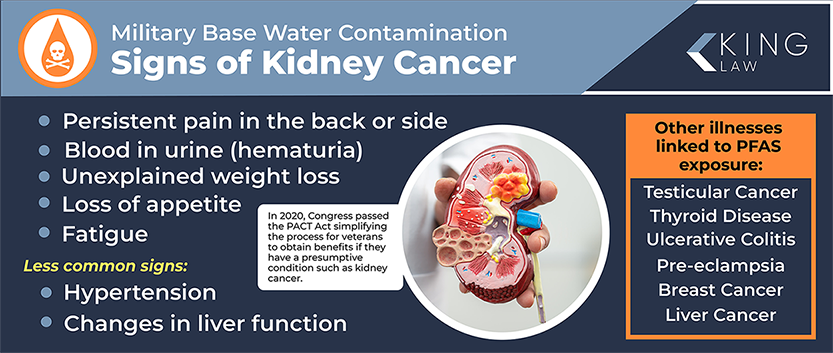
Kidney Cancer and PFAS Contamination in the Military
The U.S. Department of Veterans Affairs (VA) has acknowledged that military personnel are at risk of developing kidney cancer as a result of their service. The risk of kidney cancer in service members is related to exposure to per- and polyfluoroalkyl substances (PFAS) at military sites throughout the globe. Research shows a link between PFAS exposure and an increased risk for kidney cancer.
Table of Contents:
Kidney Cancer and PFAS Contamination in the Military
The Link Between PFAS Exposure and Kidney Cancer in Military Personnel
Kidney Cancer: Signs, Symptoms, and Side Effects
The PACT Act: Rights for Veterans with Kidney Cancer from PFAS
Veterans Affected by PFAS-Related Cancer
Filing a Claim for PFAS-Related Kidney Cancer
Policy Changes Regarding PFAS Use in the Military
The Link Between PFAS Exposure and Kidney Cancer in Military Personnel
Recent studies have shown that prolonged or repeated exposure to chemicals such as per- and polyfluoroalkyl substances (PFAS) and Trichloroethylene (TCE) has the potential to cause cancer in humans. Both are considered known human carcinogens. Military personnel across the country and throughout the world have been exposed to PFAS and TCEs through contaminated drinking water and airborne toxins from burn pits.
The U.S. Department of Veterans Affairs (VA) has acknowledged the risk by adding kidney cancer to the list of presumptive conditions related to burn pit exposure. Presumptive conditions are those that the VA assumes were caused by your service. If you were diagnosed with kidney cancer after serving in the U.S. military, you may be entitled to compensation. It is important to discuss your case with an attorney as soon as possible.
Kidney Cancer: Signs, Symptoms, and Side Effects
Early signs of kidney cancer are frequently missed or dismissed as normal fatigue. Unfortunately, it may not be until the cancer has progressed that signs become more evident.
Signs and symptoms of kidney cancer include:
- Fatigue
- Persistent pain in the back or side
- Blood in the urine (hematuria)
- Unexplained weight loss
- Loss of appetite
While the above symptoms are the most prevalent, there are some less common but still significant signs of kidney cancer, such as hypertension and changes in liver function tests that should be taken seriously. It is important to note that prolonged or repeated PFAS exposure may increase the risk of developing kidney cancer. Kidney cancer is treatable, but most treatments are not curative. Some of the treatments for kidney cancer include Opdivo and Sutent. These two drugs can be used to extend a patient’s life expectancy and improve their quality of life.

The PACT Act: Rights for Veterans with Kidney Cancer from PFAS
In 2022, Congress passed bipartisan legislation to help improve health care and benefits for veterans who had been exposed to toxic substances. The “Sergeant First Class Heath Robinson Honoring our Promise to Address Comprehensive Toxics Act of 2022” or PACT Act expands healthcare benefits for military service members who have suffered adverse health conditions as a result of exposure to toxic substances, including Agent Orange and those from burn pits such as PFAS and TCE.
The PACT Act simplifies the process for veterans to obtain benefits if they have a presumptive condition such as kidney cancer.
Kidney cancers the VA considers presumptive include:
- Chromophobe (renal cell carcinoma)
- Clear cell (renal cell carcinoma)
- Clear cell papillary (renal cell carcinoma)
- Collecting duct (renal cell carcinoma)
- Medullary (renal cell carcinoma)
- Papillary (renal cell carcinoma)
- Unclassified types (renal cell carcinoma)
- Renal sarcoma (non-renal cell carcinoma)
- Wilms tumor (non-renal cell carcinoma)
The U.S. Department of Defense has recently indicated that over 700 military bases may have PFAS contamination. A large amount of the contamination is related to the military’s continued use of Aqueous Film Forming Foam (AFFF), a fire-fighting foam known to contain PFAS and used at bases throughout the world.
Veterans Affected by PFAS-Related Cancer
The PACT Act is named for Sergeant First Class Heath M. Robinson, who died from cancer in 2020. His doctors insisted the cancer was the result of exposure to toxic chemicals. Robinson completed multiple tours in Iraq and Kosovo, where he was exposed to toxic burn pits.
Filing a Claim for PFAS-Related Kidney Cancer
If you were stationed at a military base that is contaminated with PFAS you may be entitled to file a legal claim or obtain compensation for your injuries.
Requirements for filing a claim for PFAS-related kidney cancer:
- Must have been stationed at a contaminated base
- You received a diagnosis of a presumptive condition
It is important to note that PFAS-related kidney cancer may lay dormant for 10 – 15 years, making it difficult to determine the cause. If you served in the military, particularly in a location known to have exposure to burn pits and other specific environmental hazards, it is strongly recommended that you speak with an attorney.
Policy Changes Regarding PFAS Use in the Military
In addition to providing expanded health care and benefits for veterans who were exposed to toxic substances, the PACT Act also provides additional funding for research on toxic exposures and the long-term health consequences of PFAS.
The Department of Defense (DoD) is currently in the process of performing preliminary assessments and site inspections of over 700 military installations believed to contain PFAS contamination. The DoD has implemented policies to help reduce PFAS exposure in the military, including restricting the use of AFFF.
Contact a PFAS Cancer Attorney Today
Were you diagnosed with kidney cancer after serving in the U.S. military? King Law has extensive experience handling military PFAS and kidney cancer cases. Current and former service members diagnosed with kidney cancer or another adverse health condition are strongly encouraged to contact King Law to schedule a free consultation.

